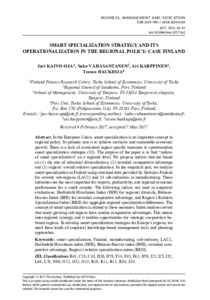Smart Specialization Strategy and Its Operationalization in the Regional Policy: Case Finland
Jari Kaivo-oja; Saku Vähäsantanen; Ari Karppinen; Teemu Haukioja
https://urn.fi/URN:NBN:fi-fe2021042717006
Tiivistelmä
In the European Union, smart specialization is an important concept in regional policy. Its primary aim is to achieve inclusive and sustainable economic growth. There is a lack of convenient region specific measures to operationalize smart specialization startegies (S3). The purpose of the paper is to find "indices of smart specialization" on a regional level. We propose indices that are based on (1) the rate of industrial diversification, (2) revealed comparative advantage and (3) regions' overall relative specialization. In the empirical part, we analyze smart specialization in Finland using structural data provided by Statistics Finland for seventy sub-regions (LAU1) and 24 sub-industries in manufacturing. These industries are the most important for exports, productivity, and regional economic performance for a small country. The following indices are used in empirical evaluations: Herfindahl-Hirschman Index (HHI) for regional diversity, Balassa-Hoover Index (BHI) for revealed comparative advantage, and Region's Relative Specialization Index (RRSI) for aggregate regional specialization differences. The concept of smart specialization is related to these measures. Index analyses reveal that many growing sub-regions have similar comparative advantages. This means inter-regional synergy, and it enables opportunities for strategic cooperation between regions. To develop smart specialization strategies for Europe's regions, we need these kinds of empirical knowledge-based management tools and planning approaches.
Kokoelmat
- Rinnakkaistallenteet [29335]
